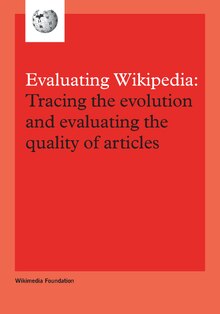How should you teach students and patrons to use Wikipedia critically?
Wikipedia is everywhere in how the modern internet user consumes knowledge: it is part of Google Knowledge Graph, Facebook, and countless other parts of the web's knowledge and information sharing infrastructure. Moreover, because its often the first result on a Google search, many members of the public turn there first to solve their information needs.
Yet, we know that many public readers don't know how to use Wikipedia critically: its almost easier to tell your patrons and students not to use it; however, that would be a great disservice to the researchers because of Wikipedia's ubiquity in our internet-mediated age. We created this portal to help provide you resources for teaching your students and patrons how to use Wikipedia more critically, and with an eye for effective research.
Teaching Wikipedia as part of digital and research literacy
edit
One of the greatest weaknesses of the public's use of Wikipedia in its research and information seeking, is that readers often don't understand how Wikipedia is made, how to use it within a research process, and other key critical thinking and digital research skills. Teaching Wikipedia readers how Wikipedia volunteers make decisions about the content is important to being able to use Wikipedia effectively, whether as a source or a tool for finding more source. The guide at File:Evaluating Wikipedia brochure.pdf, provides one of the best guides for evaluating Wikipedia content. We recommend that librarians and teachers become familiar with that guide, and even use it as a foundation for teaching students and patrons about Wikipedia.
Moreover, even when readers understand these basic skills, much of Wikipedia content is connected to reference materials that can be hard to find: teaching Wikipedia research skills opens a window into other research practices within your library's resources, such as using citations in sources to find further research materials. These skills can be applied to both Wikipedia, and the broad range of other digital research environments: Wikipedia offers both the strengths—such as high quality information and hyperlinking of resources—and weaknesses—uncertainty of authorship and reliability—of Web 2.0 as well as many of the characteristics of more traditional reference materials—such as footnotes, heavy reliance on a body of outside knowledge and standard editorial practices.

Library scholarship suggests that a substantive portion of Wikipedia readers don't understand its content; and some of these illiteracies are egregious: in a Rutgers study, one freshman college student said that the first footnote on a Wikipedia page is the best resource about that topic, unaware that the reference order corresponded to the order of their citation in the article's text. [1] As the Rutgers researchers concluded, not understanding such features on Wikipedia is a symptom of a larger digital and research illiteracy. Wikipedia can be a useful tool for directly intervening in this process using the following strategies:
- Teaching beginning researchers how to evaluate Wikipedia, within its editorial standards -- the guide File:Evaluating Wikipedia brochure.pdf is a good guideline for workshops or classes.
- Teaching students and patrons how to use Wikipedia as a "starting point" for research, showing how to use information, footnotes and external links to guide searches in library resources.
- Showing students and patrons how to use article histories and discussion pages to evaluate the articles current status within the Wikipedia community.
- For more assignment ideas from a professional librarian check out this WikiEd Foundation blog post or learn about other Teaching Strategies from a College Professor
Learning while doing
editOne of the most effective strategies for helping students and patrons learn is to engage them in the practice of knowledge creation. Wikipedia editing can be both assigned in a classroom setting as another form of research paper and taught to patrons during editing workshops, called Editathons.
Editing events and workshops
edit
Running an editing event in your library, can be a way to engage your patrons in digital citizenship, help preserve local knowledge, and teach your patrons about web resources. Moreover, teaching your patrons how to contribute to Wikipedia, is an excellent way to teach them how to access information in your library and share topics of interest to your local community with the world. These events have been run the world, and are a great way to teach literacy about Wikipedia and web-created information.
- Further resources
- A Guide for Research Libraries to Engage Wikipedia
- Advice and cases studies for cultural professionals
Classroom projects
editStudents create research projects every semester, but more often than not that work gets thrown away at the end of the semester, after being seen by only a few sets of eyes. Having students write articles on Wikipedia helps preserve their research work, and ensure that the research helps future researchers. The Wikipedia Education Program provides faculty and support staff the tools to design assignments that improve students skills in reading, writing, researching, critical thinking, translation and collaboration; gain information and media literacy; and deepen their understanding of copyright, plagiarism, citation, and digital citizenship.
In most settings, students write Wikipedia articles as substitutes for a traditional research paper, taking the pedagogical position of literature review or annotated bibliography. Typical student contributors range from upper division high school students to graduate students. These assignments engage students in writing for a global audience with real-world purpose: giving the public access to new information. There are benefits for librarians too. Education program assignments give librarians the opportunity to expose students to libraries, research, teach students information literacy, and require students to engage with the wide selection of secondary sources available to them through the research library's holdings.
- For more information and direct support for education assignments in Canada and the United States, see the Wikipedia Education Foundation.
References
edit- ^ Lily Todorinova (2015-03-09). "Wikipedia and Undergraduate Research Trajectories". New Library World. doi:10.1108/NLW-07-2014-0086. ISSN 0307-4803.
